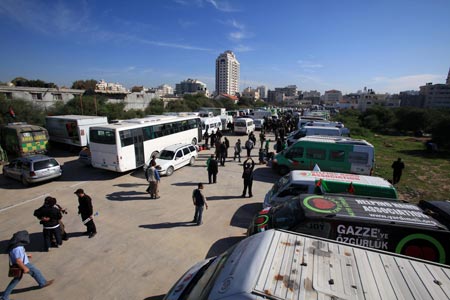Middleman Egypt encounters Gazans' frustration
The Egyptian border with the Gaza Strip witnessed a bloody day on Wednesday, with a clash between Egyptian troops and Gazan protesters leaving one dead and dozens wounded.
 |
|
International peace activists stand next 153 trucks carrying medical supplies in Gaza, Jan. 7, 2010. Egypt has reached a deal with members of an aid convoy to take supplies to Palestinians in Gaza after the demonstration of Palestinians.[Wissam Nassar/Xinhua] |
The incident erupted when supporters of the Gaza-ruling Hamas movement were protesting near the Rafah border crossing against Egypt's construction of what Hamas called a "death wall" along the borderline and its obstruction of a Gaza-bound international aid convoy.
In view of the flare-up of violence between the two Arab neighbors, which featured Egypt on the receiving end of Gazans, frustration, analysts told Xinhua on Thursday that also at play are the Israeli-Palestinian peace process, the Hamas-Fatah rivalry and the Egyptian role on both tracks.
Boiling sentiment
The latest protest at the Rafah crossing was most likely not spontaneous, said Jonathan Rynhold, a senior researcher at Israel's renowned Begin-Sadat Center for Strategic Studies, suggesting that Hamas might be directing the frustration of the besieged Gazans in specific directions.
As one of the only two Arab states that have reached peace with Israel, Egypt has committed itself to curbing the Gaza-bound illicit armament transportation, a mission that represents one of the top priorities of the Jewish state, which regards Hamas as a terrorist organization.
Meanwhile, Egypt has also kept the Rafah border crossing largely closed, adding to the tight blockade Israel has imposed upon Gaza, which has put the Arab state under fire amid accusations of cooperating with the Jewish state to strangle the already impoverished territory.
In a move that is apparently adding fuel to the fire, Egypt, citing significance of border security, has started constructing an underground steel wall along the border with Gaza, a project that, if completed, could block hundreds of tunnels Gazans have used to smuggle in various supplies as well as weapons, which are widely seen as virtually the last lifeline of Hamas.
In another move that led to Wednesday's border unrest, Egypt earlier this week tried to prevent part of an international convoy carrying hundreds of tons of aid for some 1.5 million Gazans from entering its soil en route to the blockaded enclave.
Gazan protesters strongly criticized the Egyptian actions, dubbing them shameful, before the demonstration turned ugly and gave way to violent clashes.
Peace vs. unity
The tensions along the Egypt-Gaza border flared up as Egypt has been stepping up mediation efforts for the stalled Israeli- Palestinian peace process, a factor which analysts said is also involved.
Recent weeks have seen the Arab state successively host Israeli Prime Minister Benjamin Netanyahu and Palestinian President Mahmoud Abbas, who is also the leader of the Fatah movement, in efforts to resume peace talks that have bogged down for over a year.
Meanwhile, a delegation of senior Egyptian officials are leaving for the United States for talks over the Israeli- Palestinian peace process. As another influential player in the Mideast affairs and a big source of aid for both Israel and Egypt, Washington has been calling for an early resumption of peace talks.
However, to some extent, advancing the peace process is at odds with achieving the internal Palestinian unity, as the militant Hamas group does not recognize Israel and has been launching numerous attacks against the Jewish state.
"Although Egypt is trying to find ways to advance the unity, what Israel and America want is for Abbas to push ahead with the peace process, and what Egypt, Israel and the United States want is to strengthen Abbas and weaken Hamas," said Rynhold.
Not for Israel
Even though the protest was a display of the Gazans, anger at the Egyptian moves, the anger was misplaced, said Naji Shurab, a political science professor from Al-Azhar University in Gaza.
"Egypt is not responsible for the siege imposed upon the Palestinians. Egypt tries to facilitate the living conditions of the Palestinians. Egypt is not Israel," he said, rejecting the viewpoints of some Gazans who liken Egypt to Israel as a force dedicated to subjugating them.
The Gazan leadership needs to better understand the role Egypt can play both in the regional affairs and in the betterment of the Palestinians, added Shurab.
From a different angle, Zvi Bar'el, a commentator on the Mideast affairs in Israeli daily Ha'aretz, also maintained that it was not for the sake of Israel that Egypt "clenches its iron fist on Gaza."
The moves were intended to show both Hamas and Syria, which allegedly is a major Hamas supporter like Iran, that "just as it has the power to open the border crossings at will and relieve the siege, so it can twist Hamas' arm," Bar'el wrote on Thursday.
Egypt is interested in reconciliation between Hamas and Fatah and establishment of a Palestinian unity government, "mainly because it does not want to be responsible for the Gaza Strip," but meanwhile is "fed up with Hamas' foot-dragging," added Bar'el.
Through these moves, Egypt is also trying to making it clear that "from now on Damascus and Iran no longer have exclusive control over Hamas' moves, and that Cairo has a powerful economic lever at its disposal," he wrote.
 0 Comments
0 Comments






